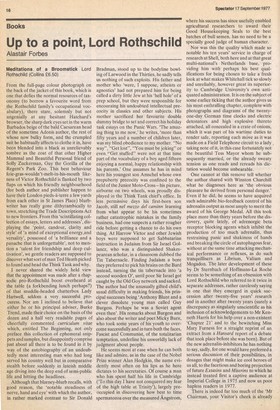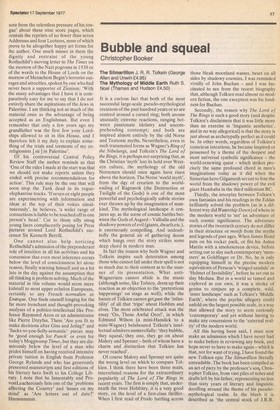Books
Up to a point Lord Rothschild
Alastair Forbes
Meditations of a Broomstick Lord Rothschild (Collins £6.50) From the full-page colour photograph on the back of the jacket of this book, which is one that defies the normal resources of tax onomy (to borrow a favourite word from the Rothschild family's occupational voc abulary), there stare, solemnly but not ungenially at any hesitant Hatchard's browser, the sharp dark eyes set in the warm Barbados beige of the bald Caesarean head of the sometime Adonis author, the rest of whose now bulky form, and the crumpled suit he habitually affects to clothe it in, have been blended into a black as unrelievably sombre as the coat of that other Higher Mammal and Beautiful Personal friend of Solly Zuckerman, Guy the Gorilla of the Regent's Park Zoo. This best behaviour foie-gras-wouldn't-melt-in-his-mouth like ness of Victor Rothschild is flanked by two flaps on which his friendly neighbourhood (for both author and publisher happen to have their London pieds-à-terre a few yards from each other in St James Place) blurb writer has really gone dithyrambically to town, stretching the Trade Descriptions Act to new frontiers. From this 'scintillating col lection of essays, letters and addresses', dis playing the 'point, candour, clarity and style' of 'a mind of exceptional energy...and versality', possessed of 'a brilliance and a panache that is unforgettable', not to mention a 'talent for friendship and deep cul tivation', we gentle readers are supposed to discover what sort of man Ted Heath picked to found and head the Think Tank and why.
I never shared the widely held view that the appointment was made after a rhap sodic pro-Rothschild boost overheard at the table (a forkbending lunch perhaps?) of that muddle-headed chatterbox Lady Hartwell, seldom a very successful pro curess. Nor am I inclined to believe that either he or his principal adviser, Burke Trend, made their choice on the basis of the dozen and a half very readable pages of cheerfully commented curriculum vitae which, entitled The Beginning, not only preface this collection of ephemeral snippets and samples, but disappointly comprise just about all there is to be found in it by way of the autobiography of an undoubtedly most interesting man who had long served his country well but in comparative stealth before suddenly in lateish middle age diving into the deep end of semi-public life and hitting the headlines.
Although that blarney-blurb recalls, with good reason, the 'notable steadiness of nerve, hand and eye' with which the author, in rather marked contrast to Sir Donald Bradman, stood up to the bodyline bowling of Larwood in the Thirties, he sadly tells us nothing of such exploits. His father and mother who 'were, I suppose, atheists or agnostics' had not prepared him for being called a dirty little Jew at his 'hell hole' of a prep school, but they were responsible for encouraing his undoubted intellectual precocity in classics and other subjects. His mother sacrificed her favourite double dummy bridge to set and correct his holiday task essays on the Punic Wars. 'The amazing thing to me now,' he writes, 'more than fifty years and a number of children later, was my blind obedience to my mother. "No way", "Get lost", "You must be joking" or even "Get stuffed" were not at that time part of the vocabulary of a boy aged fifteen enjoying a normal, happy, relationship with his parents.' One assumes he has in mind here his youngest son Amschel whose own prepuberty precocity was confined to the field of the Junior Moto-Cross — his picture, airborne on two wheels, was proudly displayed in the Think Tank chief's office. In less permissive days his first-born son Jacob, still nel mezzo del caminn learning from what appear to be his sometimes rather catastrophic mistakes in the family business, had one suspects a rather rougher ride before getting a chance to do his own thing. At Harrow Victor and other Jewish boys were supposed to get Sabbatarian instruction in Judaism from Sir Israel Gollancz, who was a distinguished Shakespearean scholar, in a classroom dubbed the Tin Tabernacle. Finding Judaism a bore they preferred to pick his brains on the Bard instead, turning the tin tabernacle into 'a second wooden 0', until poor Sir Israel got caught by the Old Goy network and sacked. The author had the unusually gifted child's usual difficulty in making friends, his principal successes being 'Anthony Blunt and a clever dissolute young man called Guy Burgess. Perhaps he was a Soviet agent even then'. His remarks about Burgess and also about the writer and poet Micky Burn, who took some years of his youth to overcome successfully and in turn both the faces, Fascist and Communist, of the totalitarian temptation, underline his unworldly lack of judgment about people.
He seems most at ease when he can both like and admire, as in the case of the Nobel Prize winner Alan Hodgkin, the name evidently most often on his lips as he here dictates to his secretaries. Of course a man who has spent half his life in Cambridge (`To this day I have not conquered my fear of the high table at Trinity'), largely preoccupied in discovering how best to time spermatozoa over the measured Angstrom, where his success has since usefully enabled agricultural researchers to award their Good Housekeeping Seals to the best batches of bull semen, has no need to be a specially good judge of human character.
Nor was this the quality which made so notable his ten years' service in charge of research at Shell, both here and at that great• multi-national's Netherlands base, providing him with perhaps his best qualifications for being chosen to take a fresh look at what makes Whitehall tick so slowly and unreliably, however great its superiority to Cambridge University's own antiquated administration. It is on the subject of some earlier ticking that the author gives us his most enthralling chapter, complete with photographs and diagrams of the twentyone-day German time clocks and electric detonators and high explosive thereto attached, all concealed in a crate of onions, which it was part of his wartime duties to render safe, reporting each move as it was made.on a Field Telephone circuit to a lady, taking note of it, in this case fortunately not the beautiful Tess Mayor whom he subsequently married, or the already sweaty tension as one reads and rereads his dictation would become unbearable.
One cannot at this remove tell whether the author shared with Winston Churchill what he diagnoses here as 'the obvious pleasure he derived from personal danger.' Even if he did, he seems to have acquired such admirable bio-feedback control of his adrenalin output as most amply to merit the award of his George Medal. All this took place more than thirty years before the discovery, quite lately, of adrenorgic beta receptor blocking agents which inhibit the production of too much adrenalin, thus restraining panic and shakiness of bands and breaking the circle of autophagous fear, without at the same time attacking mechanical performance or reflexes, as do such tranquillisers as Librium, Valium and Mogadon. The later development of these by Dr Sternbach of Hoffmann-La Roche seems to be something of an obsession with Lord Rothschild who referred to it twice in separate addresses, rather carelessly saying in one that they emerged in quick succession after twenty-five years' research and in another after twenty years (surely a discrepancy as singularly unscientific as his inclusion of acknowledgements to Mr Kenneth Harris for his help over a non-existent 'Chapter 21' and to the bewitching Miss Mary Furness for a straight reprint of an extract from a Hansard report of a debate that took place before she was born). But of the new adrenalin-inhibitors he has nothing to say, sadly, for one would have preferred a serious discussion of their possibilities, in dosages that might make ice cool heroes of us all, to the facetious and boring projection of future Extasins and Miserins to which he instead treated first a captive audience at Imperial College in 1975 and now us poor hapless readers in 1977.
There is indeed far too much of the `Mr Chairman, your Visitor's cheek is already sore from the relentless pressure of his tongue' about these nine score pages, which contain the reprints of no fewer than seven Addresses and four Lectures, none of which prove to be altogether happy art forms for the author. One much misses in them the dignity and restraint of the young Rothschild's moving letter to The Times on the morrow of the Nazi pogroms in 1938 or of the words to the House of Lords on the morrow of Menachem Begin's terrorist out rages and atrocities, spoken by one who had never been a supporter of Zionism: 'With the many advantages that I have it is comparatively easy for me to say that I do not entirely share the aspirations of the Jews in Palestine. I am thinking not so much of the material ones as the advantage of being accepted as an Englishman. But even I remember that only a few years ago my grandfather was the first Jew your Lordships allowed to sit in this House, and I therefore felt it my duty to explain something of the trials and torments of my coreligionists I sic I in Palestine'.
Of his controversial Central Policy Review Staff the author reminds us that 'One of the rules I made at the start was that we should not make reports unless they ended with precise recommendations for action'. This rule may be the one that will soon stop the Tank dead in its rogueelephantine tracks. 'If seven or eight people are experimenting with information and ideas at the top of their voices simultaneously', he believes, 'a wider range of connections is liable to be touched off in one person's head.' Cut to those silly smug young faces complacently posing for Press pictures around Lord Rothschild's successor Sir Kenneth Berrill.
One cannot also help noticing Rothschild's admission of the preponderant role of intuition in all his activities and his concession that even most inference occurs below the level of consciousness let alone reason, finally warning himself and us a bit late in the day against the assumption that all thinking is problem-solving. Much of the material in this volume would seem mere kidstuff to most upper echelon Europeans, certainly to any French normalien or Enarque. One finds oneself longing for the far more trenchant and thought-provoking analyses of a politico-intellectual like Professor Raymond Aron or an administrator like Pierre Dreyfus. These 'Are you fit to make decisions after Gins and Jetlag?' and `Sucks-to-you-Solly-semantic' pieces may be 'good enough for Punch' or even for today's Moggwump Times, but they are disastrously below the level of a man who prides himself on having received intensive private tuition in English from Professor George Rylands and who has generously presented manuscripts and first editions of his literary hero Swift to his College Library, I note that he lamentably and ProvostLeacherously lists one of the 'problems affecting the Country' and 'issues on my mind' as 'Are letters out of date?' Hmmmmmm.































 Previous page
Previous page